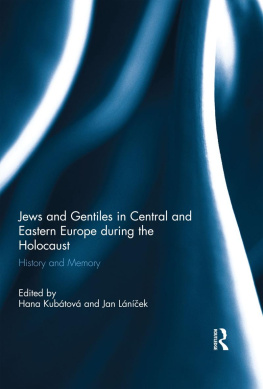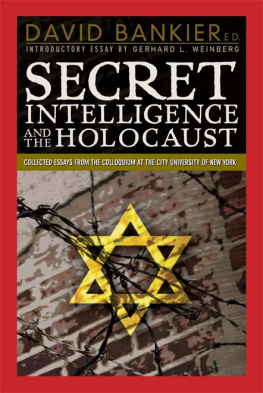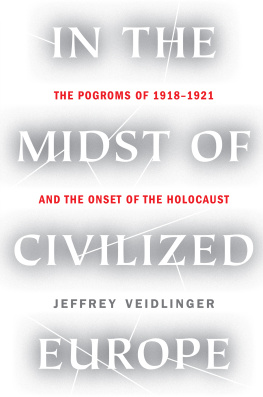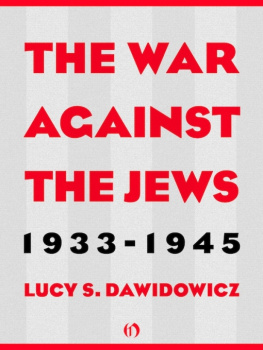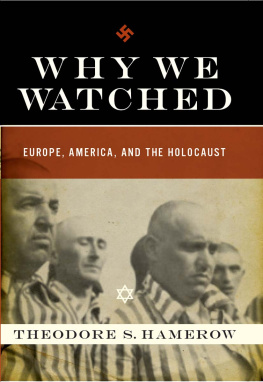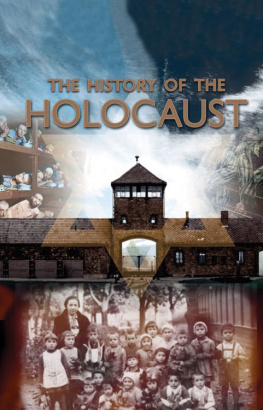First published 2013 by Pearson Education, Inc.
Published 2016 by Routledge
2 Park Square, Milton Park, Abingdon, Oxon OX14 4RN
711 Third Avenue, New York, NY 10017, USA
Routledge is an imprint of the Taylor & Francis Group, an informa business
Copyright 2013 by Taylor & Francis.
All rights reserved. No part of this book may be reprinted or reproduced or utilised in any form or by any electronic, mechanical, or other means, now known or hereafter invented, including photocopying and recording, or in any information storage or retrieval system, without permission in writing from the publishers.
Notice:
Product or corporate names may be trademarks or registered trademarks, and are used only for identification and explanation without intent to infringe.
Cover Designer: Suzanne Duda
Image Permission Coordinator: Stephan Merland
Cover Photo: Jack Kugelmass, Director, Center for Jewish Studies, University of Florida
Library of Congress Cataloging-in-Publication Data
Goda, Norman J. W.
The Holocaust : Europe, the world, and the Jews 1918-1945 / Norman J.W. Goda.
p. cm.
Includes bibliographical references and index.
ISBN-13: 978-0-205-56841-3
ISBN-10: 0-205-56841-6
1. Holocaust, Jewish (19391945) 2. World War, 19391945Jews.
3. GermanyHistory19331945. I. Title.
D804.3G62 2013
940.5318dc23
2012036298
ISBN 13: 978-0-205-56841-3 (pbk)
The term holocaust derives from the ancient Greek translation of the word olah in Hebrew scripture. The religious term referred to a sacrifice consumed wholly by fire. But in the secular context of the modern world, the English word holocaust referred to large-scale destruction of human life in a manmade or natural disaster. During and after World War II, the term holocaust, along with other expressions, came to denote the murder of nearly 6 million European Jews by Nazi Germany and its allies. At the same time, Jewish writers in Palestine (Israel after 1948) used specific secular termsthe Hebrew word Shoah (catastrophe) and the Yiddish word Churbn (destruction)to describe the annihilation of Europes Jews. The use of precise terms, combined with steadily growing interest beyond Israel, helped to solidify the use of the word Holocaust (now with a capital H) in the English-speaking world and elsewhere by the 1970s. In recent years, some have sought to (re)expand the meaning of the term to include other human tragedies. In this book, however, the term Holocaust refers to the unparalleled Jewish catastrophe.1
This particular history of the Holocaust has two goals. One is to provide instructors and their undergraduate students with a readable text containing sufficient but manageable detail. The book is arranged chronologically and geographically to reflect how persecution, experience, and choices varied over different periods and places throughout Europe and beyond, depending on the progress of World War II and depending on local circumstances. As historian Dan Stone has recently noted, there were multiple histories of the Holocaust that depended on these and other factors.2
One can also employ a more thematic approach with this book. The chapters have distinct sections on German decisions, Jewish responses, bystander reactions, and other themes. Instructors can assign sections across chapters as they prefer. Weekly assignments in either case would be brief enough so that instructors can also assign additional readings for deeper discussion on a variety of topics, including the mentality of German killers, Jewish leaders and resistors, European citizens attitudes during deportations, the degradation of humanity in ghettos and camps, the Vaticans silence regarding the destruction of the Jews, the possibilities of Allied actions to stem the killing process, and many more. English-speaking students should find the footnotes and the Starting Points for Further Reading at the end of the book to be helpful guides for further reading and paper assignments.
My second goal is to provide a somewhat broader set of perspectives than is often the case in undergraduate texts. Many narratives of the Holocaust proceed from the German vantage point, beginning with the rise of Adolf Hitler and the Nazi Party. Through the rubric of Nazi racism and brutality, they follow German state policies toward Germanys Jews, then toward Jews in Poland, France, the USSR, and elsewhere, who fell under Nazi control. These narratives also show how the Nazis killed substantial numbers of other social and racial enemies. These other victims included communists, homosexuals, Jehovahs Witnesses, the disabled, Roma, African and Soviet prisoners of war, and millions of civilians in the Nazi-occupied territories that were declared suitable for settlement by Germans only. This approach makes sense. The Nazis gave the world its first government that placed race at the center of its worldview. How they made and implemented their murderous decisions regarding Jews and their other victims is crucial.
But the Holocaust is also a chapter in Jewish and even world history. The very title of historian Lucy S. Dawidowiczs pioneering 1975 study, The War Against the Jews, notes the absolute centrality of the Jews to Nazi thinking.3 The Jews were the Nazis primary racial enemy. It was the Jewsfrom Jewish leaders to Jewish infantswho were slated for complete and swift annihilation in areas where the Germans wished to settle and also in areas where they did not. The Jews were also an imagined geopolitical enemy. The Nazis believed that world Jewry was united in a formidable and diabolical global conspiracy against which Germany waged a life-or-death struggle. Berlin Jews were supposedly behind Germanys collapse in 1918, Minsk Jews were supposedly behind the Soviet partisan movement in 1942, New York Jews were supposedly behind the bombing of German cities in 1943, Budapest Jews were supposedly behind the cracks in the Axis alliance in 1944, and so on.
The scope of Nazi thinking about the Jews had a long, international development. More than a century before the Nazis climbed to power, Jews and non-Jews throughout Europe wrestled with what social commentators called the Jewish question. In forging modern national citizenries, what was to be done with Jewish populations that were never accepted as truly European and were believed to have an alien and, for some, even a malevolent character? Should Jews be forced to acculturate? What if they did not? What if Jews acculturated and still retained their supposed alien characteristics? What if canards about existential dangers of Jews were believed by a critical mass of people? The Jewish question dated from the dawn of modernity, but the political, financial, and social turmoil in Europe during and after World War I triggered dangerously escalating passions toward the Jews, who, according to many, were at the root of the disorder. Despite hard-won Jewish rights in most European countries, many Europeans saw Jews as more foreign and more malignant than ever.




